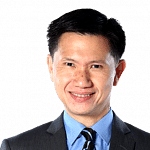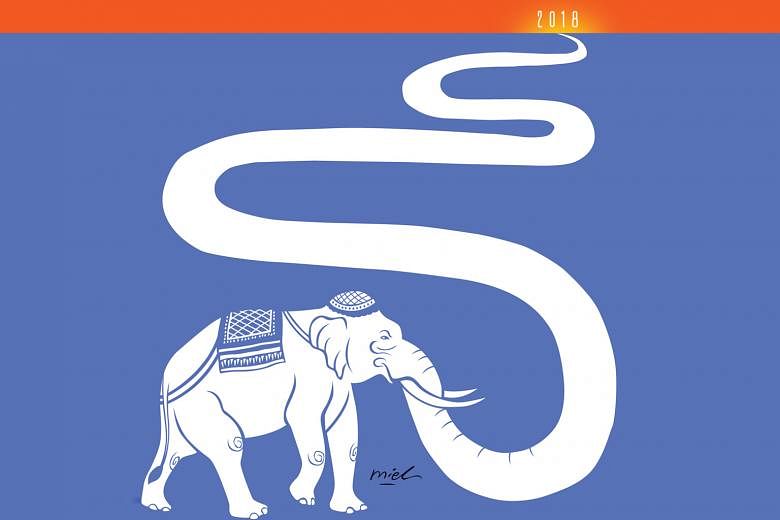Thailand enters uncharted waters this year.
Come May, it will complete a four-year interregnum following its most recent military coup, on May 22, 2014, led by General Prayut Chan-o-cha and his junta known as the National Council for Peace and Order. That putsch ousted an elected government, headed by former prime minister Yingluck Shinawatra and under the control of her elder brother Thaksin Shinawatra, who was similarly overthrown in the coup of September 2006.
These twin coups bookended the twilight of King Bhumibol Adulyadej's glorious 70-year reign which ended on Oct 13, 2016.
The first eliminated the threat posed by Thaksin's juggernaut and the nexus of electoral forces, police and military officers along with sections of the bureaucracy and collusive business groups, and the second subsequently ensured the Thai military's exclusive role as the midwife of the royal succession.
Now that the throne has been passed to King Maha Vajiralongkorn, King Bhumibol's only son and the longstanding crown prince, Thai politics is in dire need of recalibration among the major institutions and protagonists of the land as it strives for a new equilibrium, one that will take into account the needs of an electoral democracy drawing from a more informed electorate and a traditional monarchy underpinned by the military and a new king.
At issue are two entwined transitions that Thailand must now go through.

First, bringing back elections after a four-year hiatus is now an imperative. The junta-led government is beset with growing corruption scandals, while its economic management has been subpar. After the royal succession and cremation of King Bhumibol last October, the pervasive sentiment is that junta legitimacy has reached its expiry date. Politicians and civil society groups have been agitating for elections and a change of government, giving rise to civil-military tensions.
But while elections are often synonymous with democracy, this is not the Thai case, where ballots and genuine democratic rule are poles apart. Democratic institutions, such as political parties, the Constitution, and Parliament, must be strengthened to provide effective outlets for an electorate fed up with systematic patronage and corruption by elected representatives over the decades.
New talent must be encouraged into the party system. The pro-military Constitution, naturally crafted by a junta-appointed committee, requires a complete makeover to be pro-democracy. Justice and the rule of law must be seen as fair and equal, not stacked and uneven in favour of the power holders of the day. More importantly, a culture of accountability and popular demand for rights and freedoms coupled with responsibility and integrity needs to be promoted and nurtured.
Thai democracy, in other words, does not arise from holding elections alone but from the hard and sustained effort of instilling values, and building institutions and mechanisms to exercise them.
After several delays during his stint as Prime Minister, Gen Prayut has now pledged that the next election will take place by this November.
To be sure, the Constitution is so rigged in favour of the military - for example, through its entirely appointed 250 members of the 750-strong legislature - that the generals will still be able to call many shots in Thai politics. Yet whatever change that takes place and replaces the military government would have to come from the next election.
While further election delays are plausible, as the generals fear retribution and loss of control, these are unlikely because the Thai people are no longer giving the same slack to the top brass like they used to, prior to the royal cremation.
So Gen Prayut and his band of brothers will likely manipulate the electoral landscape to the hilt by undermining competition from Thaksin's Pheu Thai and the Democrat Party, and by co-opting other smaller parties before a poll is allowed.
This brings us to the second key transition: The holding of elections eventually will bring up Thailand's other, more fundamental and structural, shift towards a 21st-century constitutional monarchy.
Contrary to facile depictions, Thai politics is not about the colours of yellow versus red, or about democratic rule against military dictatorship. At its core, modern Thailand is the sum total of socio-political developments of the past seven decades, from 1947 to last year, during King Bhumibol's reign.
This period can be subdivided into two eras - the first five decades and the last two, demarcated by the Cold War and the 21st century.
Thailand now needs to reconcile, through compromise and mutual accommodation, the overlapping forces of these two eras that now harbour conflicting interests and preferences.
From 1947 to 1997, the Thai economy expanded almost 6 per cent per year. The long boom imploded during the 1997-98 economic crisis, but by then Thailand's socio-political foundations had been transformed, anchored in the military-monarchy symbiotic relationship that saw Thailand through the Cold War.
Add to this the burgeoning bureaucracy from the early 1960s, and you have Thailand's current political order - one that revolves around the military, monarchy and bureaucracy. Notwithstanding the elections and political parties that came and went, these three traditional institutions represented Thailand's Cold War fighting machine.
King Bhumibol's reign was so spectacularly successful in combating communism and ushering in economic development that it brought about its own challenges. The sustained growth eventually emboldened previously marginalised voices that now demand to be heard through democratisation.
Most importantly, international circumstances changed, with no more communists to fight but instead, with new international norms of democracy and human rights to adhere to.
Thailand's twin coups in 2006 and 2014 effectively were a rearguard action from the old political order to forestall changes that they see as an existential threat, as personified by Thaksin.
Without King Bhumibol's immense charisma and moral authority, there has to be a new kind of politics that shifts some power and authority from the traditional pillars of the state to democratic institutions that are needed to underpin Thailand's future. But democracy in Thailand also has to perform better in keeping graft at bay and delivering more satisfactory governance to the people.
No formula is smooth and watertight for Thailand's way forward. It will require learning by doing, negotiating and bargaining, but a spirit of compromise and accommodation is paramount.
Perhaps the 10th reign under King Maha Vajiralongkorn can be just the right incentive for all parties concerned to ensure that it succeeds, by making sure that Thailand's traditional monarchy moves into a new balance with 21st-century democracy.
• The writer teaches international political economy and directs the Institute of Security and International Studies at Chulalongkorn University's faculty of political science in Bangkok.


